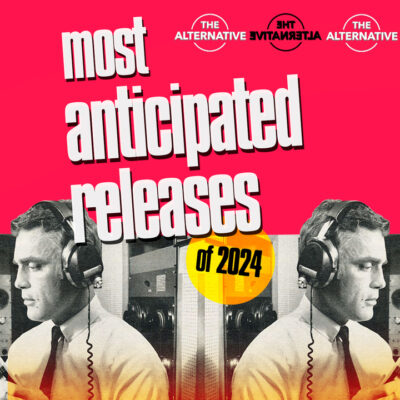Interview: Pillow Talk songwriter Josh Cannon
Posted: by Riley

Photo by Sam Leathers
Memphis alt/emo group Pillow Talk put out their new record This Is All Pretend two weeks back via Animal Style Recordings and our own Riley Savage spoke with songwriter Joshua Cannon a little while back about what went into the record, interesting musical influences, and how One Direction inadvertently gained them fans.
Check it out:
RILEY SAVAGE: On your new album, This is All Pretend, you utilize some new tools and production techniques – auto-tune, pitch-shifting, vocoder, etc. How did you decide to integrate these new sounds?
CANNON: I’ve always been attracted to how artists like Kanye West and Justin Vernon utilize auto-tone to transform their voice into an instrument. Our influences have always stood largely outside the scope of what’s normally associated with indie music, even if it wasn’t communicated in our execution. But in writing this record, we were particularly inspired by such a wide array of music — to think of ourselves as a rock band felt confining. We kind of threw to the wind all expectations we had about what type of record “we were supposed to write.” I started toying more directly with vocoder, and as a band we started experimenting with electronic elements that were absent from our previous work. It’s not reinventing the wheel, but it felt like a new world for us, a much more natural world, and this LP feels the truest we’ve been to ourselves.
We really look up to bands and artists who are pushing music forward in one way or another. Bon Iver’s 22, A Million, Kevin Abstract’s American Boyfriend, Frank Ocean’s Blond(e), those are records blurring genres and turning the needle. Sufjan Steven’s The Age of Adz, that’s a record that came out like seven years ago and is still progressive. I think Pillow Talk is only scratching the surface with This Is All Pretend, but the goal is to keep moving in that direction and moving out of our comfort zone.
SAVAGE: Pillow Talk member Calvin Lauber is also a well-known producer whose worked with Julien Baker, Mayfair, and others. Does having a producer in the band help with the recording process?
CANNON: It does, no doubt. I’ve been writing music with Calvin since we were 15 years old or so, recording it upstairs at his mom’s house. We’re about as close to brothers as two could be, which helps because even though he’s recorded music for as long as I’ve known him, he’s grown into a talented producer who knows how to turn my scatter-brained ideas into something cohesive. I think I can speak for the rest of the band in saying that, too. We recorded the foundation for these songs with Matt Talbott at Earth Analog in Tolono, Illinois, but Calvin brought the tracks back home to Ardent Studios and poured over them for months. It couldn’t have been conceptualized and written without all of us coming to the table, but Calvin’s production brought the songs to life in a way I think only he knew how to do.
SAVAGE: The album artwork for the LP appears to be an embroidered piece. Can you tell us a little bit about how that artwork came to be?
CANNON: The lyrics for this record were written over a difficult two-year period that saw my grandmother’s health decline, a cancer scare for my mother (she’s fine now), and a deteriorating relationship. Amongst that, Pillow Talk essentially broke up, and weren’t in the same room with each other for months. I wasn’t sure if the record would ever be completed. I entered a stent of self-abuse that I kept hidden, dissociating from friends and treating those close to me pretty poorly.
Enter Michelle Kingdom: words don’t do her talent justice. I stumbled upon an article about her artwork. In the interview, she said her embroidery was “a synthesis of several key elements including memories, relationships, photographs, literature, personal mythology, art history and imagination.” It resonated with me, and correlated almost too well with the theme of our LP, which is more or less about the duality between foresight and hindsight and the process of aging. Thematically, I thought the name of that particular work, “What is done cannot be undone,” served as a nice subtext beneath the title of our album.
SAVAGE: On Twitter, you named artists like Tame Impala, Kanye West, Blood Orange and the Killers as inspiration for the new record. How did these influences manifest in the final recordings?
CANNON: All of those artists made records that stood out to us as explorative. So we were conscious about bringing in elements foreign to our songwriting like synthesizers, piano, and horns. Growing up, I liked how concept records were thematic. Not that This Is All Pretend is a concept album, but it is autobiographical, and for that reason, we were careful in how we strung the tracks together. But, speaking to Dev Hynes, Blood Orange’s Freetown Sound is cinematic. It listens like a film score. And it was my hope that our record would listen like that too.
I wanted our album to feel like a journey, because, corny as it may be, that’s what writing it felt like for me. I started in one place and grew into a very different person by the time it was finished.
SAVAGE: When former One Direction member Zayn released his single “Pillow Talk,” I understand you guys gained some new fans. Can you talk about that experience a little bit?
CANNON: One of the wilder experiences we’ve had, for sure. We went from 700 followers to a few thousand in a couple of hours. His sister messaged us and shared our music. But overall, and I hate to sound rude, the luster vanished. At first, there were a few hundred genuinely interested people who happened upon us through 1D fandom. But it turned into a lot of fake or inactive accounts, and anything we posted was swamped by Zayn-dom. We actually went through and manually blocked thousands of accounts recently in hopes that we could reach people who were there for our stuff. But we still get like five new followers from that universe every day. I hope that guy writes a new song soon.
SAVAGE: You guys are from Memphis, TN. What’s the scene like there? Are there any other hometown artists we should check out?
CANNON: All of us grew up playing in various projects beneath the umbrella of a local nonprofit label named Smith Seven Records. Brian Vernon, who started the label, booked shows at a now defunct skate park, his living room, or anywhere that would have us. After breaking even, he’d give whatever was made to charity or someone in need. As a kid, it shaped the way I focused my energy when booking shows, and my interpretation of DIY came to look something like utilizing nontraditional spaces and avenues to lift others up. It was a support system, wrapped in ethos that wasn’t found in a lot of other scenes around town. We try to carry that ethos with us as best we can. The scene is a lot different now, though. There’s fewer DIY spaces, but a handful of great venues. The Hi-Tone is our usual spot. We played a venue named The Vera Project in Seattle sometime ago, and it operated in similar ethos as Smith Seven. We’re trying to create an all-ages art space in Memphis similar to Vera, rooted in the environment Smith Seven birthed when we were teenagers.
Memphis is a music town and there’s pockets of bands spread across genres all over the city. China Gate, Monticello, Wicker, Nots, those are some of my favorites. But the hip-hop scene is impressive, too. Our buddy Jon Waltz is making great music.
SAVAGE: Other than your own, are there any other releases you’re anticipating this year?
CANNON: Julien Baker’s next LP is going to blow people away. We’re touring with some friends from Chattanooga named Superbody in April, and I’ve fallen in love with their music. It’s already out, but our friends in Sinai Vessel released a powerful album at the beginning of the year. David Bazan’s new record. That man’s output is something to admire and his perspective is important. I am so thankful for PWR BTTM and can’t wait for that record. The new Sorority Noise record drops soon and will be in constant rotation.
– Riley Savage










